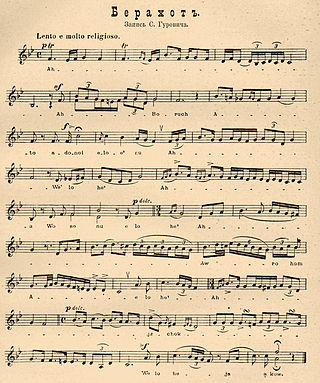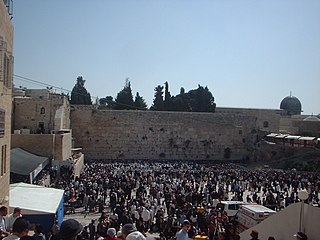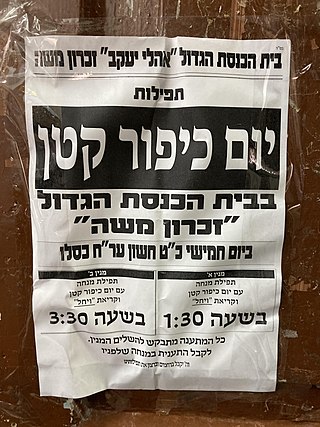
Shema Yisrael is a Jewish prayer that serves as a centerpiece of the morning and evening Jewish prayer services. Its first verse encapsulates the monotheistic essence of Judaism: "Hear, O Israel: YHVH is our God, YHVH is one", found in Deuteronomy 6:4.

The Amidah, also called the Shemoneh Esreh, is the central prayer of the Jewish liturgy. Observant Jews recite the Amidah at each of three daily prayer services in a typical weekday: morning (Shacharit), afternoon (Mincha), and evening (Ma'ariv). On Shabbat, Rosh Chodesh, and Jewish festivals, a fourth Amidah (Mussaf) is recited after the morning Torah reading, and once per year, a fifth Amidah (Ne'ilah) is recited, around sunset, on Yom Kippur. Due to the importance of the Amidah, in rabbinic literature, it is simply called "hatefila". According to legend, the prayer was composed by the rabbis of the Anshei Knesset HaGedolah. Accordingly, in Judaism, to recite the Amidah is a mitzvah de-rabbanan, i. e., a commandment of rabbinic origin.

Kiddush, literally, "sanctification", is a blessing recited over wine or grape juice to sanctify the Shabbat and Jewish holidays. Additionally, the word refers to a small repast held on Shabbat or festival mornings after the prayer services and before the meal.

Hoshana Rabbah is the seventh day of the Jewish holiday of Sukkot, the 21st day of the month of Tishrei. This day is marked by a special synagogue service, the Hoshana Rabbah, in which seven circuits are made by the worshippers with their lulav and etrog, while the congregation recites Hoshanot. It is customary for the scrolls of the Torah to be removed from the ark during this procession. In a few communities a shofar is sounded after each circuit.
A seudat mitzvah, in Judaism, is an obligatory festive meal, usually referring to the celebratory meal following the fulfillment of a mitzvah (commandment), such as a bar mitzvah, bat mitzvah, a wedding, a brit milah, or a siyum. Seudot fixed in the calendar are also considered seudot mitzvah, but many have their own, more commonly used names.
Mussaf is an additional service that is recited on Shabbat, Yom Tov, Chol Hamoed, and Rosh Chodesh. The service, which is traditionally combined with the Shacharit in synagogues, is considered to be additional to the regular services of Shacharit, Mincha, and Maariv. In contemporary Hebrew, the word may also signify a newspaper supplement.

The Priestly Blessing or priestly benediction, also known in rabbinic literature as raising of the hands, rising to the platform, dukhenen, or duchening, is a Hebrew prayer recited by Kohanim. The text of the blessing is found in Numbers 6:23–27.
Pe'ah is the second tractate of Seder Zeraim of the Mishnah and of the Talmud. This tractate begins the discussion of topics related to agriculture, the main focus of this seder (order) of the Mishnah. The tractate discusses the laws of gifts to the poor when a person harvests their field, vineyards or trees, based on commandments in the Torah. The tractate also deals with the laws of giving charity in general. The tractate is called Pe'ah because the first part of the tractate deals with the laws of Pe'ah, while the remaining part of the tractate deals with a number of other related topics.

Mo'ed Katan or Mo'ed Qatan is the eleventh tractate of Seder Moed of the Mishnah and the Talmud. It is concerned with the laws of the days between the first and last days of Passover and Sukkot. These days are also known as "Chol HaMoed" days. Mo'ed Katan also discusses the laws of Aveilus (Bereavement). Consisting of only three chapters, it has a Gemara from both Babylonian Talmud and the Jerusalem Talmud.
In Judaism, a berakhah, bracha, brokho, brokhe is a formula of blessing or thanksgiving, recited in public or private, usually before the performance of a commandment, or the enjoyment of food or fragrance, and in praise on various occasions.

Berakhot is the first tractate of Seder Zeraim of the Mishnah and of the Talmud. The tractate discusses the rules of prayers, particularly the Shema and the Amidah, and blessings for various circumstances.

Shabbat is the first tractate of Seder Moed of the Mishnah and of the Talmud. The tractate deals with the laws and practices regarding observing the Jewish Sabbath. The tractate focuses primarily on the categories and types of activities prohibited on the Sabbath according to interpretations of many verses in the Torah, notably Exodus 20:9–10 and Deut. 5:13–14.
Tikkun Chatzot, also spelled Tikkun Chatzos, is a Jewish ritual prayer recited each night after midnight as an expression of mourning and lamentation over the destruction of the Temple in Jerusalem. It is not universally observed, although it is popular among Sephardi and Hasidic Jews.
Pesukei dezimra, or zemirot as they are called in the Spanish and Portuguese tradition, are a group of prayers that may be recited during Shacharit. They consist of various blessings, psalms, and sequences of other Biblical verses. Historically, reciting pesukei dezimra in morning prayer was a practice of only the especially pious. Over the course of Jewish history, their recitation has become widespread custom among all of the various rites of Jewish prayer.
Nafka minnah is a Talmudic phrase used in analytical debates. It is often used in the phrase Mai nafka minnah?, which asks, "What is the practical difference?"

Yom Kippur Katan, is a practice observed by some Jews on the day preceding each Rosh Chodesh. The observance consists of fasting and supplication, but is much less rigorous than that of Yom Kippur proper.
Baruch HaShem Le'Olam is a compilation of 18 verses from Tanach that is recited by some minyanim during weekday Maariv between Shema and Amidah. Its name is from the first 3 words of the first verse.

Jewish law and custom prescribe ritual hand washing in a number of situations. This practice is generally known by the Hebrew term נטילת ידיים, which literally means taking up of the hands.
Right precedence in Judaism is a Minhag of Hasids to give precedence to the right side of things. A well-known exampled is putting on the right shoe before the left.









